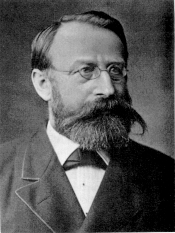
Carl Wilhelm Friedrich Launhardt (7 April 1832 – 14 May 1918) was a German mathematician and economist.
Launhardt was born in Hannover, the capital of the Kingdom of Hannover. He studied and taught at Hannover's technical school. Following Hannover's annexation by the Kingdom of Prussia, Launhardt served in the Prussian House of Lords.
In 1885 he succeeded in calculating the optimal rate of duties in the sense of the effects of the terms of trade.
Works
[edit]
- Wilhelm Launhardt, A. Bewley (1900). The Theory of the Trace. Lawrence Asylum Press.
The Theory of the Trace: Being a discussion of the principles of location,...
, 1872 - "Die Bestimmung des Zweckmässigsten Standortes einer Gewerblichen Anlage", Zeitschrift des Vereines Deutscher Ingenieure, 1882. Translated as "Determining the most convenient location for a commercial plant", the magazine of the Association of German Engineers.
- Mathematische Begründung der Volkswirtschaftslehre, 1885. Translated as "Mathematical foundation of economics".
- Theory of Network Planning, 1888.
- Launhardt, Wilhelm (1885). Mathematische Begründung der Volkswirtschaftslehre (in German). Leipzig: Engelmann, Wilhelm. Retrieved 23 June 2015.
Well, that’s interesting to know that Psilotum nudum are known as whisk ferns. Psilotum nudum is the commoner species of the two. While the P. flaccidum is a rare species and is found in the tropical islands. Both the species are usually epiphytic in habit and grow upon tree ferns. These species may also be terrestrial and grow in humus or in the crevices of the rocks.
View the detailed Guide of Psilotum nudum: Detailed Study Of Psilotum Nudum (Whisk Fern), Classification, Anatomy, Reproduction